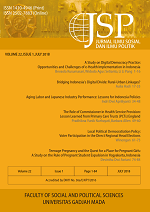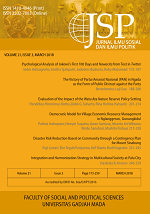When Solidarity is Trampled by Religious Sentiment: Outlining Indonesian Muslim Solidarity toward Rohingya Refugees
Siti Aliyuna Pratisti(1*), Taufik Hidayat(2), Deasy Silvya Sari(3)
(1) Department of International Relation, Faculty of Social and Political Sciences, Padjadjaran University
(2) Department of International Relation, Faculty of Social and Political Sciences, Padjadjaran University
(3) Department of International Relation, Faculty of Social and Political Sciences, Padjadjaran University
(*) Corresponding Author
Abstract
The Rohingya crisis in Myanmar has drawn international attention due to gross violations of human rights, which have occurred in the conflict. This condition forces the Rohingya to flee from conflict areas in the attempt to seek protection from neighbouring countries including Indonesia. To deal with the refugees, the Indonesian government, alongside Muslim organizations, have taken immediate steps in tackling the crisis. However, behind the humanitarian solidarity lays a critical problem related to the religious sentiment toward the Buddhist community in Indonesia. The sentiment that tarnished the humanitarian principles and threatened Indonesian multiculturalism showed the versatile side of identity. To provide a better understanding of identity-based conflict, this article explored how a group’s sense of collectivity can easily turn into sentiment. By conducting multiple interviews with the representatives of Muslim Organizations and also collecting secondary data related to the Islam conservative agenda, this paper aimed to outline the paradox of Indonesian Muslim response toward the Rohingya’s refugees crisis. Using Ross’s theories of identity conflict and using Galtung conception of social conflict, the findings concluded that religious sentiment in Indonesia during the Rohingya’s refugee crisis are led by blind fanaticism toward certain religious beliefs that bitterly trample the nation’s sense of solidarity.
Keywords
Full Text:
PDFReferences
Arendshorst, J. (2009). The dilemma of non-interference: Myanmar, Human Rights, and the ASEAN Charter. Northwestern Journal of International Human Rights, 8(1), 102–121.
ASEAN leaders address Myanmar’s Rohingya crisis, but refuse to point finger at Aung San Suu Kyi. (2018, March 18). South China Morning Post. Retrieved from https://www.scmp.com/news/asia/ southeast-asia/article/2137712/asean- leaders-address-myanmars-rohingya- crisis-refuse-point.
Basedau, M., Struver, G., Vullers, J., & Wegenast, T. (2011). Do religious factors impact armed conflict? Empirical evidence from Sub-Saharan Africa. Terrorism and Political Violence, 23(5), 752-779. doi:10.1080/09546553.2011.619240
BBC Indonesia. (2017). Kekerasan Rohingya: Apa yang harus dilakukan warga Indonesia?. Retrieved from http://www.bbc.com/ indonesia/indonesia-41144847.
BBC Indonesia. (2017). Polisi tetapkan siaga satu di Borobudur hingga Sabtu. Retrieved form https://www.bbc.com/indonesia/indones ia41183998?ocid=socialflow_twitter.
Creswell, J. & Clark, P. V. (2007). Designing and conducting mixed methods research. California: Sage.
Dirdjosanjoto, P. (1999). Memelihara umat (Kiai Pesantren-Kiai Langgar di Jawa). Yogyakarta: LKIS.
Dozens of Rohingya come ashore in Indonesia. (2018, April 20).The Jakarta Post. Retrieved from http://www.thejakartapost.com/ news/2018/04/20/dozens-of-rohingya- come-ashore-in-indonesia.html.
Erdianto, K. (2017). Jangan lihat isu Rohingya sebagai konflik antara Islam dan Buddha. Retieved from https://nasional.kompas. com/read/2017/09/06/06410621/jangan-lihat-isu-rohingya-sebagai-konflik- antara-islam-dan-budha.
Galtung, J. (1958). Theories of conflict: Definition, dimension, negation and formation. New York: Columbia University Press.
Gelfand, M. J. & Cai, D. A. (2004). Cultural st ruct uring of t he social cont ext of negotiation. In M. J. Gelfand & J. M. Brett (Eds.), The handbook of negotiation and culture (pp. 238-257). California: Stanford Business Books.
Habibollahi, A., McLean, H., & Diker, Y. (2013). Crimes against humanity the case of the Rohingya People in Burma (Rep.). Otawa, Canada: The Norman Paterson School of International Affairs.
Hagan, J. & Rymond-Richmond, W. (2009). Darfur and the crime of Genocide. Cambridge: Cambridge Press.
Hidayat, T., Sari, D. S., & Pratisti, S. A. (2017). Moving beyond identity-based solidarity: Transnational moslem community engagement toward the Rohingya refugees. Advances in Social S cience, Education and Humanities Research, 136(22), 404-409. doi: 10.2991/ icosop-17.2018.63
Hodges, A., & Rayda, N. (2017). Indonesian Islamists recruiting volunteers for Rohingya jihad. The Australian. Retrieved from https:/ / www.theaustralian.com.au/ f9cd04129233827d4f2ba9f17664d844.
Jati, I. (2017). Comparative study of the roles o f A S E A N a n d th e o r ga ni z a ti o n o f Islamic cooperation in responding to the Rohingya crisis. IKAT: The Indonesian Journal of Southeast Asian Studies, 1(1), 17-32. doi: 10.22146/ikat.v1i1.27466
Kappen, T. R. (1995). Structures and international institutions. Cambridge: Cambridge University Press.
Kastoriano, R. (2000). Immigration, transnational communities and citizenship. Journal Revue Internationale des Sciences Sociales, 16(5), 353-358.
Khin, M.Y. (2005). Salience of ethnicity among Burman muslims: A study in identity Formation. Intellectual Discourse, 13(2), 161-179.
Kyaw, Y. H., Taylor, R., & Tin, M. T. (2005). Myanmar: Beyond politic s to societal imper atives . Singapore: Inst it ut e of Southeast Asian Studies.
Linberg, J. (2008). Running on Faith?. Oslo: Oslo University Press.
Luhtanen, R., & Crocker, J. (1992). A collective self-esteem scale: Self-evaluation of one’s social identity. Personality and Social Psychology Bulletin, 18(1), 302-318. doi: 10.1177/0146167292183006
Martin, M. F., Margesson, R. & Vaugh, B. (2017). The Rohingya crises in Bangladesh and Burma (Rep.). Washington, USA: Congressional Research Service.
Milani, C., & Laniado, R. (2007). Transnational social movements and the globalization agenda: A methodological approach based on the analysis of the world social forum. Brazilian Political Science Review, 1(2), 10-39.
Milton, A. H., Rahman, M., Hussain, S., Jindal, C., Choudhury, S., Akter, S., & Efird, J. T. (2017). Trapped in statelessness: Rohingya refugees in Bangladesh. International Journal of Environmental Research and Public Health, 14(8), 942. doi:10.3390/ ijerph14080942
Raharjo, S. N. I. (2015). Peran identitas agama dalam konflik di Rakhine Myanmar tahun 2012–2013. Jurnal Kajian Wilayah, 6(1), 35-59. doi: 10.14203/jkw.v6i1.68
Ross, J. D. (2002). Promoting human rights. Ethics and International Affairs, 16(2), 27-31. doi: 10.1111/j.1747-7093.2002.tb00393.x
Ross, M. H. (2002). Psychocultural interpretations and dramas: Identity dynamics in ethnic conflict. Political Psychology, 22(1), 157-178. doi: 10.1111/0162-895X.00231
Ross, M. C. (2007). Cultural contestation in ethnic conflict. New York: Cambridge University Press.
Seul, J. R. (1999). Ours is the way of God’: Religion, identity, and intergroup conflict. Journal of Peace Research, 36(5), 553–569.
Stryker, S., & Burke, P. J. (2000). The past, present, and future of an identity theory. Social Psychology Quarterly, 63(4), 284-297. doi: 10.2307/2695840
Wilson, C. (2008). Ethno-Religious Violence in Indonesia (From soil to God). London and New York: Routledge.
Wilson, I. (2014). Morality racketeering: V igilantism and populist Islamic militancy in Indonesia. In K. Teik, V. Hadiz, & Y. Nakanishi (Eds.). Between dissent and power: The transformation of Islamic politics in the Middle East and Asia. Basingstoke: Palgrave Macmillan.
Wolff, S. (2006). Ethnic conflict: A global perspective. London: Oxford.
Zeitlin, I. M. (1998). Memahami kembali sosiologi, kritik terhadap teori sosiologi kontemporer. Yogyakarta: Gadjah Mada Press.
Article Metrics
Refbacks
- There are currently no refbacks.
Copyright (c) 2019 Jurnal Ilmu Sosial dan Ilmu Politik

This work is licensed under a Creative Commons Attribution-NonCommercial-NoDerivatives 4.0 International License.






















